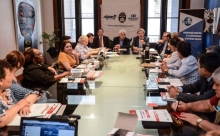International Anti-corruption Day, 9 December - Who is protecting the workers who fight corruption?

Recent years have seen an increase in warnings by whistleblowers: workers reporting wrongdoings or corruption they have become aware of. Unfortunately, these workers are the first to suffer attacks from those involved in public and private corruption.
The increased demand to fight corruption is not accompanied by the provision of adequate protection for workers whose job it is to fight corruption. The public still does not seem to fully understand the importance of protecting these first warnings and alerts by workers who would be able to counter threats to health, education, the economy and life, had they enjoyed the necessary working conditions and protection.
PSI’s fight against corruption kicked off at its 2012 World Congress, and once again occupies a preponderant place in the new Programme of Action for the period 2017-2022, adopted at PSI 30th World Congress, held in Geneva from 30 October to 3 November 2017. The PoA explicitly vows to “protect workers who fight corruption in the public administration from objective labour violence, especially employees of state control, justice, tax and inspection bodies, to guarantee decent working conditions.”
The report Checkmate to corruption: Making the case for a wide-ranging initiative on whistleblower protection, published last year, and the Symposium on the Protection of Whistleblowers, held in Geneva on 30 October 2017, shed light on these complex issues, highlighting – among other things – the double role of trade unions in assisting whistleblowers and having an active role in the creation, development, and adoption of protective frameworks. After the Symposium, it was also evident that we needed to take concrete steps to chart the way forward to broaden affiliate engagement and to strategize towards achieving the goals set out in the PoA.
On 7 December 2017, PSI convened a meeting in Buenos Aires – jointly organized by UITOC and the unions part of the Red de Trabajadores ICJ (AEFIP, APOC and UEJN) – to agree on a platform for key affiliates to actively engage at national and international level in the protection of whistleblowers. The fight against corruption requires a strong commitment and coordination among PSI affiliates to ensure that workers who disclose wrongdoing – especially those of the independent audit institutions, tax revenue agencies, and judicial bodies – are protected from reprisal and are rewarded for doing what is fair and just.
The participants to this follow-up meeting to the Symposium on the Protection of Whistleblowers specifically:
- Reflected on the conclusions of the Symposium
- Discussed an action plan and the creation of a PSI Whistleblowers’ Task Force that will coordinate the implementation of the decisions adopted at the meeting.
- Agreed to promote a global alliance with other trade union organisations, NGOs, civil society and other partners willing to fight corruption and protect whistleblowers.
- Adopted a declaration of goals and intentions
In commemorating International Anti-Corruption Day, PSI and some key affiliates are taking concrete steps for the effective involvement of public sector trade unions in the fight against corruption. We hope that this move will encourage other affiliates to follow suit and take the leadership in the protection of workers who fight corruption.

